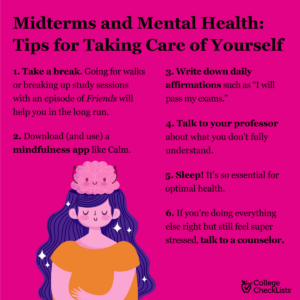By Jessica Ward
Mid-October to Thanksgiving break is midterm season at colleges across the nation! Notorious for sleepless nights, midterm week is a stressful time for students. If you’re in the midst of the madness, here’s what you can do to take care of yourself.

1. Take a break — seriously
When your nose is buried in your textbook, it’s easy to forget that there’s an entire life outside of your dorm room. It’s tempting to spend all your spare time studying, but that’s more likely to cause burnout than be beneficial. Make it a point to regularly take walks, talk to friends, or watch an episode of your favorite show to break things up. You won’t do well on your exam if you’re miserable!
2. Download mindfulness apps to your phone
While it’s generally wise to stay off your phone while you study, apps like Calm will guide you through short meditations when you start to feel overwhelmed. Browse the App Store to find apps that best suit your needs, or download a bunch and give them each a try throughout the week!
3. Say or write daily affirmations
“I will pass my exams”
“I will make it through midterms week”
“I am deserving of compassion and love even when I’m stressed”
Whatever you need to hear, say it to yourself! When your self-talk is positive, it helps keep negative thoughts at bay and gives you more motivation to tackle any obstacles in your way. It is recommended to do this first thing in the morning and then as you need it during the day. If you prefer to write your affirmations, don’t forget to re-read them to give yourself an extra boost of confidence!
4. Talk to your professor about what you don’t fully understand
No, your professor is not going to be mad that you didn’t say something sooner. They want you to do well. Visit their office hours with the study guide in hand, ready to ask specific questions about what you’re stuck on. They are happy to help you, and now you don’t have to figure it out by yourself.
5. Get some sleep
It’s only natural; you want to stay awake and study as much as possible. The fact is, studying while exhausted will only hurt you. Sleep is essential to retain the information you study, as well as keep you healthy. Set a reasonable bedtime and a reasonable morning alarm– you’ll be more alert and have an easier time focusing, plus you’ll be a lot happier too!
6. Talk to a counselor
If the stress is still too much, reach out to one of your college’s mental health counselors. They are there for you, and since they specialize in college students, they’ll likely have good, realistic resources to help you deal with the stress. There’s no shame in talking to someone!
7. Keep it in perspective
Let’s talk about worst case scenarios for a second. Worst case scenario, you make poor marks on your exam. Worst case scenario, you can’t get your overall grade back up. Worst case scenario, you have to retake the class next year. And guess what? One low test grade probably isn’t going to cause all of that anyway. While failing seems scary, remember it’s a part of life– we all have a number of failures under our belt. But if you keep studying and taking care of yourself, you have nothing to worry about!